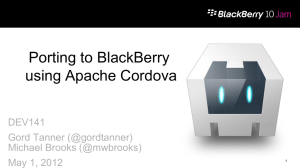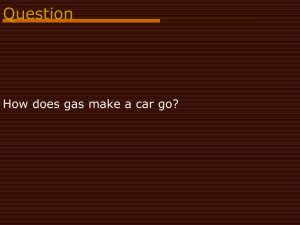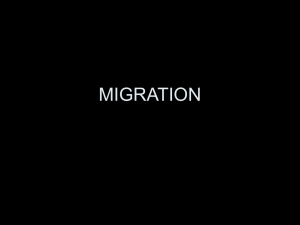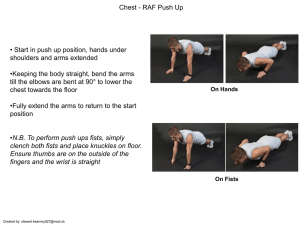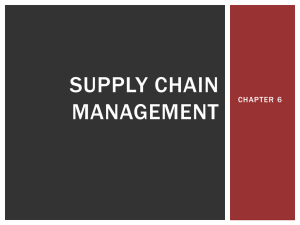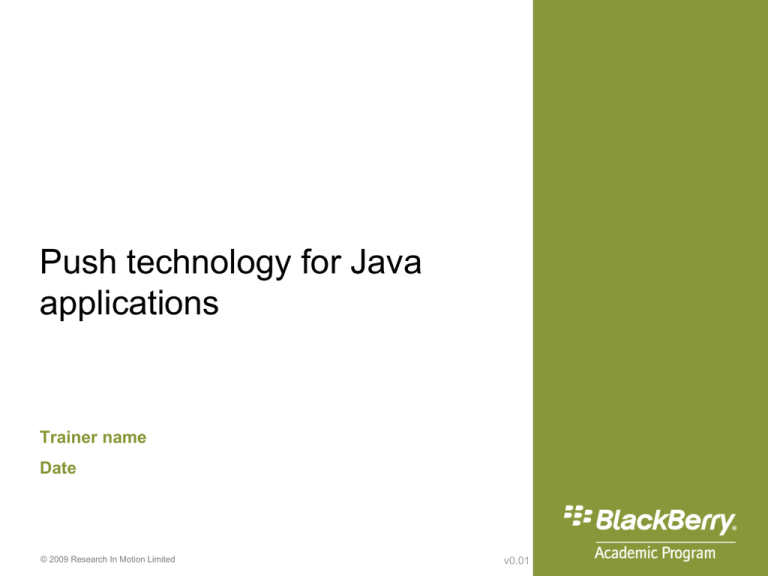
Push technology for Java
applications
Trainer name
Date
© 2009 Research In Motion Limited
v0.01
Revision history
Document version
0.1
736-01827-123
Date
Updated by
Angela-Jo Griffin
© 2009 Research In Motion Limited
Description of revision
Initial content creation
Agenda
In this course, you will cover the following topics:
– Introduction to Java® application development for mobile
devices
– Understanding Java APIs for mobile devices
– Developing a user interface for mobile devices
– Push technology for Java applications
– Introduction to threading and background processing
– Network communication for mobile devices
– Testing and debugging an application
API
© 2009 Research In Motion Limited
application programming interface
Push technology for Java applications
Introduction to push technology for Java applications
Objectives:
– Describe push technology
– Describe client/server push Java applications for a
mobile device such as a BlackBerry smartphone
– List and explain the advantages and disadvantages
of push technology for mobile devices
– Write a basic client/server push Java application for
a mobile device such as a BlackBerry smartphone
© 2009 Research In Motion Limited
Introducing push technology
Introducing push technology
Push technology:
– The ability to proactively deliver, or push, data to
BlackBerry smartphones
© 2009 Research In Motion Limited
Introducing push technology
Push applications for the BlackBerry® Enterprise
Server:
– Use the BlackBerry MDS Connection Service
component of the BlackBerry Enterprise Server to
deliver data or web content directly to any
BlackBerry smartphone
– Users do not need to request or download data
– The push application, in conjunction with the
BlackBerry MDS Connection Service, delivers the
data as soon as it is available
© 2009 Research In Motion Limited
Introducing push technology
Two applications are required to push data to a
BlackBerry smartphone:
– Server-side push application that submits the push
request
– Client-side listener application that listens for
incoming push messages
Introducing push technology
Server-side push application:
– Designed to send HTTP POST requests to the
BlackBerry MDS Connection Service on the web
server listen port
– The HTTP POST requests contain delivery
parameters and the data to be pushed
– The BlackBerry MDS Connection Service then
delivers the data to a specified port number on the
BlackBerry smartphones within a specified time
frame
HTTP
MDS
Hypertext Transfer Protocol
Mobile Data System
Introducing push technology
Client-side listener application:
– Listens for data to be delivered to its specific port
number
– You can create a custom BlackBerry MDS Java
Application designed to listen for and handle
pushed data
– You can push web content to the BlackBerry®
Browser
– The BlackBerry Browser has an integrated listener
thread
Introducing push technology
The BlackBerry MDS Connection Service:
– Manages the flow of pushed data from various push
applications
– Sends the data to the BlackBerry smartphone using
the same encrypted channel that is used for data
communication between the BlackBerry
smartphone and the BlackBerry Enterprise Server
– Pushes data to individual users or to user groups
© 2009 Research In Motion Limited
Client/server push application
Client/server push application
Client/server push applications:
– Consist of a custom client BlackBerry smartphone
application and a server-side application
– Push content to the client BlackBerry smartphone
– Provide more control than browser push
applications
– Provide more flexibility regarding the type of data
sent and how the BlackBerry smartphone
processes and displays the data
© 2009 Research In Motion Limited
Client/server push application
Advantages:
– Store data on the BlackBerry smartphone
– Make network connections based on the
information that comes in
– Integrate the data with BlackBerry applications
© 2009 Research In Motion Limited
Client/server push application
Server-side push applications:
– Make requests to the BlackBerry MDS Connection
Service to push data to specified BlackBerry
smartphone users
Requests include push delivery parameters that:
– Uniquely identify the push request
– Inform the BlackBerry MDS Connection Service
which BlackBerry smartphones to send the data to
– Provide additional delivery information, such as the
priority and the reliability level of the push request
© 2009 Research In Motion Limited
Client/server push application
Supported push formats:
– PAP push format
– RIM® push formats
PAP
RIM
© 2009 Research In Motion Limited
Push Access Protocol
Research In Motion
Client/server push application
PAP push format:
– Sends an HTTP POST request to the BlackBerry MDS
Connection Service.
– The request contains a MIME multipart message that includes
two components
• An XML-based PAP control entity that defines the delivery
parameters
• The data to be pushed
– The PAP push format is an open standard developed by the
MIME Multipurpose Internet Mail
Open Mobile Alliance.
XML
© 2009 Research In Motion Limited
Extensions
Extensible Markup Language
Client/server push application
RIM push format:
– Sends an HTTP POST request to the BlackBerry MDS
Connection Service
– Pushes content as a byte stream
– The destination port is specified within the URL of the pushed
content, and the destination users and other delivery
parameters are specified in HTTP headers included with the
request
– Is a proprietary push format supported exclusively by the
BlackBerry MDS Connection Service and BlackBerry
smartphone
URL
© 2009 Research In Motion Limited
Uniform Resource Locator
Client/server push application
A push request consists of:
– The data to be pushed
– A set of delivery parameters
© 2009 Research In Motion Limited
Client/server push application
Both the PAP push and RIM push formats support the
following features:
– Reliable push requests
– Deliver-Before time stamp
– Deliver-After time stamp
© 2009 Research In Motion Limited
Client/server push application
PAP push service also supports the following features:
– Push cancellation
– Push status query
© 2009 Research In Motion Limited
Client/server push application
Client-side listener applications
– Client-side listener applications listen for incoming
data
– You can create a custom BlackBerry MDS Java
Application that contains a listening thread that
listens for incoming data on a specified port
– To create a Java-based push application
architecture, you must create both the custom
client-side application that receives the pushed data
and the server-side application that makes the push
request
© 2009 Research In Motion Limited
Client/server push application
Push applications provide a wider range of applications that
enhance the BlackBerry experience for BlackBerry smartphone
users.
You can use push applications for time- and location-sensitive
alerts, such as:
– News and weather
– Banking and stocks
– Medical services
– Sports scores
– Backup notifications
© 2009 Research In Motion Limited
Advantages and disadvantages of push
technology for mobile devices
Advantages and disadvantages of push technology for
mobile devices
Advantages:
– Immediacy
– Efficiency
– Reduced latency
– Longer battery life
– Shorter learning curve
© 2009 Research In Motion Limited
Advantages and disadvantages of push technology for
mobile devices
Disadvantages:
– Limited format
– No delivery status for individuals within a group
address
© 2009 Research In Motion Limited
Client/server push Java applications
Client/server push Java applications
Your server-side application can use the PAP push format to send
the following three types of requests to the BlackBerry MDS
Connection Service:
– Push request
• Permits you to push data to the specified recipients
– Status-query request
• Permits you to query the status of a push request for one
or more specified recipients
– Cancellation request
• Permits you to cancel a push request for one or more
specified recipients
© 2009 Research In Motion Limited
Client/server push Java applications
Send the request as an HTTP POST request to the
BlackBerry MDS Connection Service.
If the BlackBerry MDS Connection Service is configured
to support secure connections, you can use the HTTPS
protocol.
The HTTP POST request must use the following format:
POST http://<MDS_CS>:<MDS_CS_port>/pap
<message>
© 2009 Research In Motion Limited
Client/server push Java applications
To create a PAP push request:
1. Send an HTTP POST request.
2. To push content to multiple recipients using PAP,
add multiple address tags to the post request.
3. To push content to a group using PAP, in the
recipient addresses part of the push submission,
prefix the group name with the $ character.
© 2009 Research In Motion Limited
Client/server push Java applications
RIM push format:
– Your server-side application can use the RIM
push format to send both the data and the
delivery parameters to the BlackBerry MDS
Connection Service in a single byte stream.
– Send the request as an HTTP POST request to
the BlackBerry MDS Connection Service.
– If the BlackBerry MDS Connection Service is
configured to support secure connections, you
can use the HTTPS protocol.
© 2009 Research In Motion Limited
Client/server push Java applications
RIM push format:
– The HTTP POST request must use the following
format:
POST http://<MDS_CS>:<MDS_CS_port>/push?
DESTINATION=<destination>&PORT=<client_port
>&REQUESTURI=<uri>
<headers>
<data>
© 2009 Research In Motion Limited
Client/server push Java applications
You can create a RIM push request three different
ways:
1. To push content to one or multiple BlackBerry
smartphone users using a RIM push request, send
an HTTP POST request using the following URL
format.
http://mdsServer:web server listen
port/push?DESTINATION=destination&
PORT=port&REQUESTURI=uri headers content
© 2009 Research In Motion Limited
Client/server push Java applications
2. To push content to multiple recipients using a RIM
push, include multiple DESTINATION parameters in
the query string.
http://mds_server:8080/push?DESTINATION=
user1@rim.com&DESTINATION=user2@rim.com&POR
T=7874&REQUESTURI=/
3. To push content to a group using RIM push, in the
recipient addresses portion of the push submission,
prefix the group name with the $ character.
© 2009 Research In Motion Limited
© 2009 Research In Motion Limited
Legal Disclaimer
The following trademarks and/or registered trademarks of Research In Motion are referred to in this
presentation:
– BlackBerry®
– Research In Motion® (only include if it appears in the webinar/presentation)
– RIM® (only include if it appears in the webinar/presentation)
The following BlackBerry products are referred to in this presentation: (include all items from the official
BlackBerry products list that appear in the webinar/presentation)
– BlackBerry® Internet Service
– BlackBerry® Enterprise Solution
– BlackBerry® Enterprise Server
– BlackBerry® Pearl™ 8100 smartphone
– BlackBerry® Curve™ 8300 smartphone
The following third-party trademarks are referred to in this presentation: (include all third-party products that
appear in the webinar/presentation)
– Microsoft® Excel®
– Microsoft® SQL Server®
Please remove any products not mentioned in this presentation and add all mentioned products before
completing this presentation. Also, remove any remaining red text.
© 2009 Research In Motion Limited
Legal Disclaimer
© 2009 Research In Motion Limited. All rights reserved. BlackBerry®, RIM®, Research
In Motion®, SurePress™ SureType® and related trademarks, names and logos are the
property of Research In Motion Limited and are registered and/or used in the U.S. and
countries around the world. All other trademarks are the property of their respective
owners. This documentation is provided "AS IS" and without condition, endorsement,
guarantee, representation or warranty, or liability of any kind by Research In Motion
Limited and its affiliated companies, all of which are expressly disclaimed to the
maximum extent permitted by applicable law in your jurisdiction.
© 2009 Research In Motion Limited


